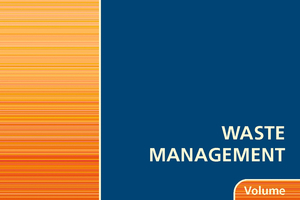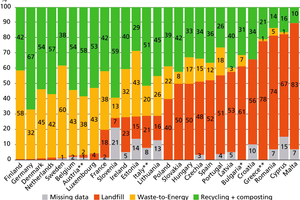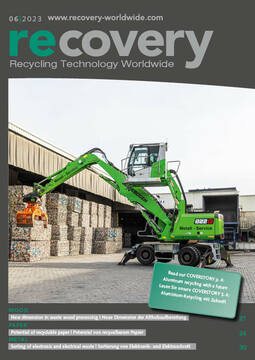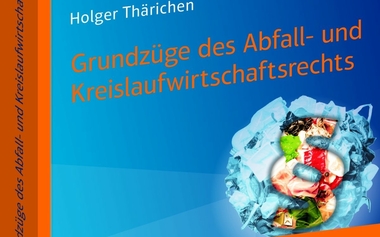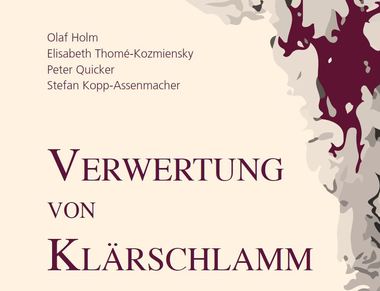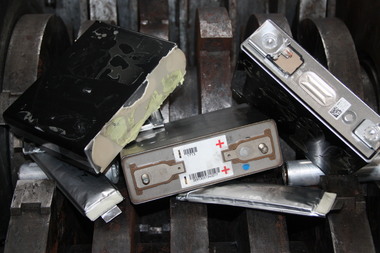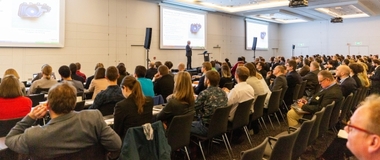Review: Waste Management Vol. 10
By Stephanie Thiel, Elisabeth Thomé-Kozmiensky, Franz Winter and Dagmar Juchekova; Thomé-Kozmiensky Verlag GmbH, Neuruppin 2022; ISBN 978-3-944310-64-0 (310 pages with acknowledgements, list of authors, sponsors and keywords, 93 pictures, 47 tables).
Energy transition, climate change, renewable energies are buzzwords that are currently on everyone‘s lips – not only in Germany – and are discussed and debated in political, technical, and economic bodies, but also in public. Energy generated from waste can also be assigned to the category “renewable energies“ without any ifs and buts. The importance of this energy sector is shown by numerous studies and lectures or panel discussions that have been prepared or held on the subject, but which primarily shed light on the technical side of the issue. For many years, Thomé-Kozmiensky Verlag GmbH has been organizing various scientific conferences on the topic of circular economy in the broader sense, most of whose lectures are published in scientific books. This includes an international congress on the topic of “Waste-to-Energy“, i.e. “From Waste to Energy“, which already experienced its tenth edition in 2022. The topic will remain relevant in the future, because even with the exclusive generation of renewable energy, waste will be produced that cannot be completely recycled and is sensibly sent for thermal recovery, thus contributing to the energy economy, such as sewage sludge.
This book, which was published “only“ as an e-book this year, presumably for reasons of sustainability, is based on this conference and contains the current political, economic, technical and legal developments on the aforementioned topic. In the individual technical contributions, the specific knowledge is presented in detail and supported with numerous diagrams, tables and explanations. In contrast to many other national and international publications on the subject of “Energy from Waste“, which are mostly available as individual publications in trade journals or in electronic form, this is a technical book that comprehensively presents the latest findings, taking politics and law into account, since these cannot be separated from a holistic view of waste management.
In accordance with the publisher‘s many years of good experience, the technical book has been subdivided according to the conference program:
EU policy (2 contributions)
Country reports (2 contributions)
Technologies, concepts and markets (3 reports)
Sewage sludge (2 contributions)
Solid recovered fuels (2 papers)
Slags and fly ashes (1 entry)
CO2 capture, storage and utilization (5 papers)
In total, 38 experts from Germany, Austria, Belgium, Great Britain, Italy, Poland, India and Pakistan have their say in 18 contributions. This alone shows that this important topic is not only of great importance in the countries of the European Union. Nevertheless, Europe in particular has set itself a number of environmental targets and adopted a new action plan (“Fit for 55“) as well as corresponding laws, regulations and directives, which are described in detail in the two contributions “Overview of Current Developments in EU Policy“ and „The Road to a Green Deal for the EU Waste Industry“ in the Policy section, highlighting the importance of energy from waste as well as its contribution to the new EU target of generating 40 % of energy from renewable sources by 2020.
In the Country Reports section, the current status and waste management targets of individual countries with regard to the generation of energy from waste are presented. Interesting details are provided for the lesser-known waste management practices in India and Pakistan, including major cities. Also of interest are the extensive statistical data on energy production from waste in 2021 in the United Kingdom and the export of the energy (electricity and heat) produced in this way to Europe.
The following subject-specific chapters could altogether be accommodated under the section „Technologies, Concepts and Sales Markets“, but they are listed as equal chapters with their own main topics.
The mentioned section starts with a detailed presentation of technologies for energy generation from waste (WtE) (mainly residual waste from households) by the Institute of Sanitary Engineering, Water Quality and Waste Management at the University of Stuttgart in the so-called “ISWA White Paper“. This gives the reader an excellent overview of the different technologies, their areas of application, the capacities and markets that exist for them. Other review articles cover advanced concepts for sewage sludge as an input to WtE plants and opportunities and risks for engineering, procurement and construction of plants especially in times of crisis such as during the COV-19 pandemic.
The following chapters on sewage sludge, fuels from solid waste and slags, and fly ashes communicate strategies and development trends, marketing potentials, and concrete applications for energy production and co-firing, partly under country-specific considerations.
The chapter on “CO2 capture, storage and utilization“ contains most of the contributions, an indication of the importance of this subject and also of the fact that it is a comparatively young field. Thus, in the first contribution, the reader can get an excellent overview of the state of knowledge in Europe and, further on, learn many reasons why CO2 removal deserves priority in the WtE field. However, not only the removal or capture of CO2 is discussed in the articles, but also the utilization of CO2 into chemicals or fuels. Finally, the Polish approach to the development of a CCU (Carbon Capture and Usage) technology is explained and the planning of a CO2 capture plant for the WtE plant in Krakow is presented against the background of the Polish market development in the context of the circular economy there.
The book is very clearly laid out, the individual chapters are color-coded and the authors are listed at the end of each article with their contact details so that the interested reader can obtain further information. The extensive literature appended to each contribution can also serve as a guide for further in-depth study of the topic. The author index as well as a subject index help the reader to find specific authors or subject references. The excellent quality of the printing should also be emphasized, especially the pictures and diagrams, so that details are easily recognizable.
Once again, the publisher has succeeded in presenting a sophisticated technical book that represents the current state of knowledge – now for the 10th time – in the field of “Energy from Waste“ It can be recommended both to newcomers and to experts from science, technology and industry, but also to specialized authorities, in order to inform themselves about the current state of knowledge and legislation, but also as a stimulus for their own scientific work.

